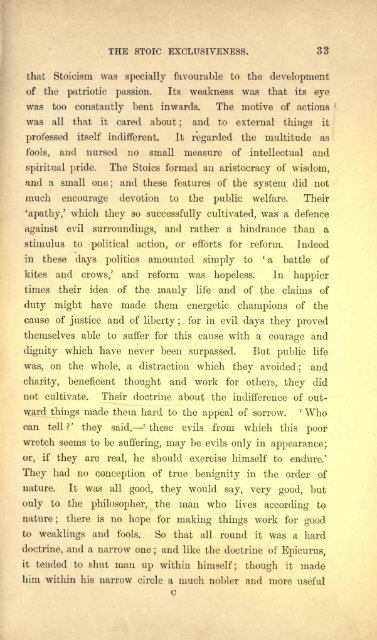Stoics and Saints - College of Stoic Philosophers
Stoics and Saints - College of Stoic Philosophers
Stoics and Saints - College of Stoic Philosophers
You also want an ePaper? Increase the reach of your titles
YUMPU automatically turns print PDFs into web optimized ePapers that Google loves.
THE STOIC EXCLUSIVENESS. 33<br />
that <strong>Stoic</strong>ism was specially favourable to the development<br />
<strong>of</strong> the patriotic passion. Its weakness was that its eye<br />
was too constantly<br />
bent inwards. The motive <strong>of</strong> actions<br />
was all that it cared about<br />
;<br />
<strong>and</strong> to external things it<br />
pr<strong>of</strong>essed itself indifferent. It regarded<br />
the multitude as<br />
fools, <strong>and</strong> nursed no small measure <strong>of</strong> intellectual <strong>and</strong><br />
spiritual pride. The <strong><strong>Stoic</strong>s</strong> formed an aristocracy <strong>of</strong> wisdom,<br />
<strong>and</strong> a small one; <strong>and</strong> these features <strong>of</strong> the system did not<br />
much encourage devotion to the public welfare. Their<br />
apathy, which they so successfully cultivated, was a defence<br />
against evil surroundings,<br />
<strong>and</strong> rather a hindrance than a<br />
stimulus to political action, or efforts for reform. Indeed<br />
in these days politics amounted simply to a battle <strong>of</strong><br />
kites <strong>and</strong> crows/ <strong>and</strong> reform was hopeless. In happier<br />
times their idea <strong>of</strong> the manly<br />
life <strong>and</strong> <strong>of</strong> the claims <strong>of</strong><br />
duty might have made them energetic champions<br />
<strong>of</strong> the<br />
cause <strong>of</strong> justice <strong>and</strong> <strong>of</strong> liberty ;<br />
for in evil days they proved<br />
themselves able to suffer for this cause with a courage <strong>and</strong><br />
dignity which have never been surpassed. But public life<br />
was, on the whole, a distraction which they avoided ;<br />
<strong>and</strong><br />
charity, beneficent thought <strong>and</strong> work for others, they did<br />
not cultivate. Their doctrine about the indifference <strong>of</strong> out<br />
ward things made them hard to the appeal <strong>of</strong> sorrow. Who<br />
can tell? they said, these evils from which this poor<br />
wretch seems to be suffering, may be evils only in<br />
appearance;<br />
or, if<br />
they are real, he should exercise himself to endure.<br />
They had no conception <strong>of</strong> true benignity<br />
in the order <strong>of</strong><br />
nature. It was all good, they would say, very good, but<br />
only to the philosopher, the man who lives according to<br />
nature ;<br />
there is no hope for making things work for good<br />
to weaklings<br />
<strong>and</strong> fools. So that all round it was a hard<br />
doctrine, <strong>and</strong> a narrow one<br />
;<br />
<strong>and</strong> like the doctrine <strong>of</strong> Epicurus,<br />
it tended to shut man up within himself; though<br />
it made<br />
him within his narrow circle a much nobler <strong>and</strong> more useful<br />
c

















